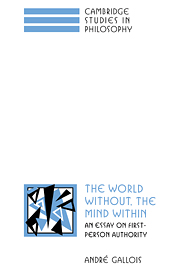Book contents
- Frontmatter
- Contents
- Preface
- Introduction
- PART I FIRST–PERSON AUTHORITY
- PART II THE BASIC AND EXTENDED ACCOUNTS
- PART III SELF-KNOWLEDGE AND CONTENT EXTERNALISM
- 8 Arguments from content externalism
- 9 Deflationary self-knowledge: Davidson and Burge
- 10 Externalism and first-person authority
- 11 Psychological properties as secondary
- Bibliography
- Index
8 - Arguments from content externalism
Published online by Cambridge University Press: 23 January 2010
- Frontmatter
- Contents
- Preface
- Introduction
- PART I FIRST–PERSON AUTHORITY
- PART II THE BASIC AND EXTENDED ACCOUNTS
- PART III SELF-KNOWLEDGE AND CONTENT EXTERNALISM
- 8 Arguments from content externalism
- 9 Deflationary self-knowledge: Davidson and Burge
- 10 Externalism and first-person authority
- 11 Psychological properties as secondary
- Bibliography
- Index
Summary
According to an externalist theory of content (for short ETC) the content of an individual's thoughts and the meanings of her words need not supervene on her intrinsic history. Two individuals may be intrinsically exactly alike yet entertain different thoughts, and attach different meanings to the words they use. Externalist theories of content, while controversial, have gained widespread acceptance. I am not concerned here to defend such theories. My concern is to examine the claim that externalist theories conflict with first-person authority. Some claim that if an externalist theory is true, we lack first-person authority over, at any rate, our beliefs. Since externalist theories are both popular and plausible, it is well worth assessing arguments for that claim.
In chapter two I considered different sceptical positions on selfknowledge. According to (1) we have no first-person authority over, or privileged access to, our propositional attitudes. According to (2) we have, at best, contingent privileged access to some of our propositional attitudes. ETC features as a premiss in arguments for (1), that we have no knowledge of our consciously held propositional attitudes, or (2), that our knowledge of some of our consciously held propositional attitudes is no different in kind from, and no better than, the knowledge that others have of them. Whether one takes such arguments to be arguments for (1), or only (2), depends on whether one accepts, with Paul Boghossian, the following. Any knowledge we have of our consciously held propositional attitudes is non-observational. In the remainder of this chapter I will set out three arguments from ETC against first-person authority.
- Type
- Chapter
- Information
- The World Without, the Mind WithinAn Essay on First-Person Authority, pp. 155 - 160Publisher: Cambridge University PressPrint publication year: 1996



